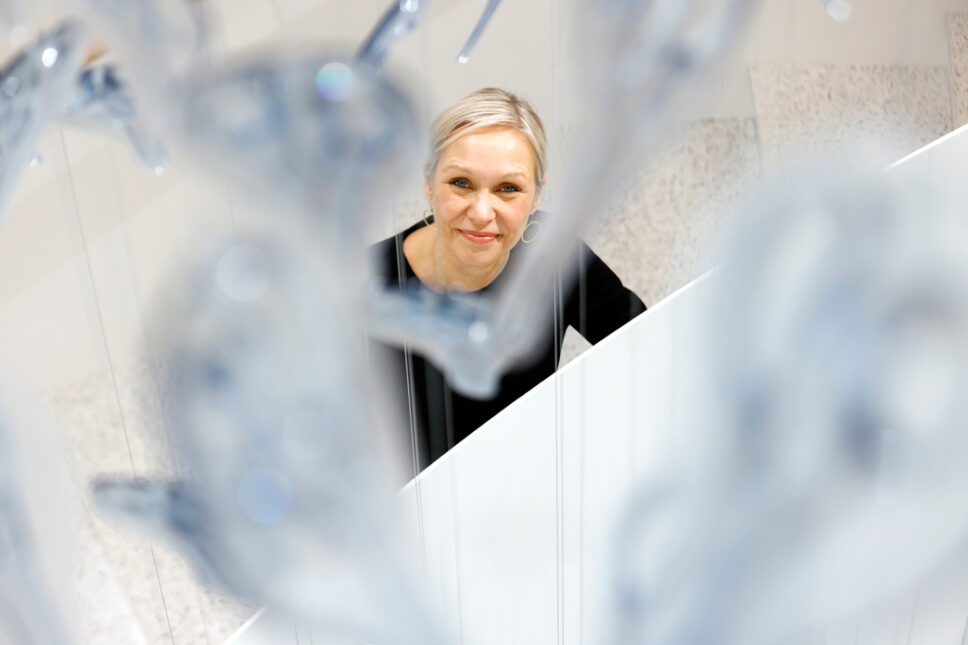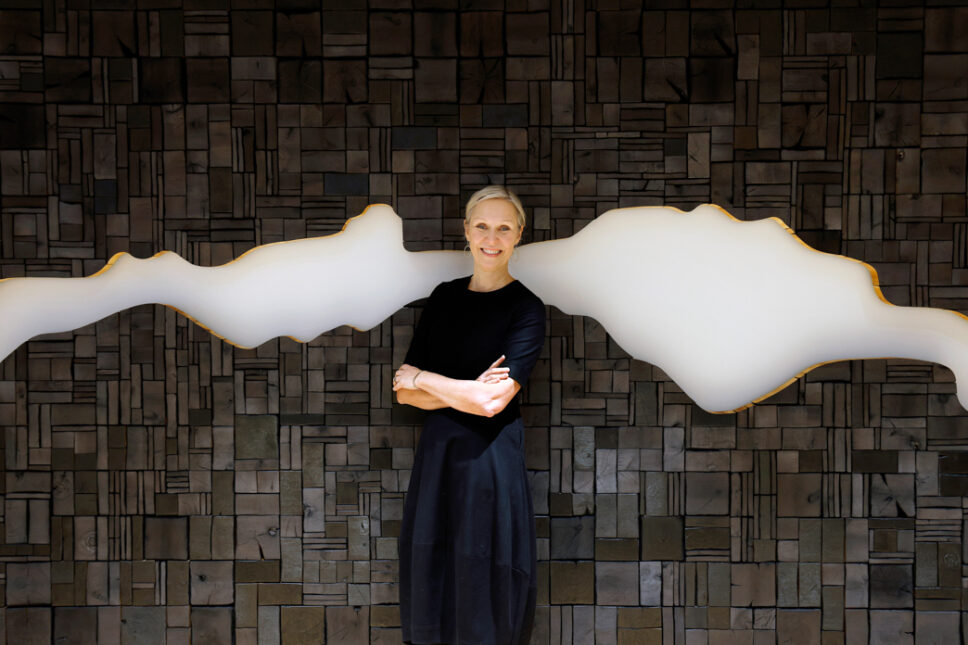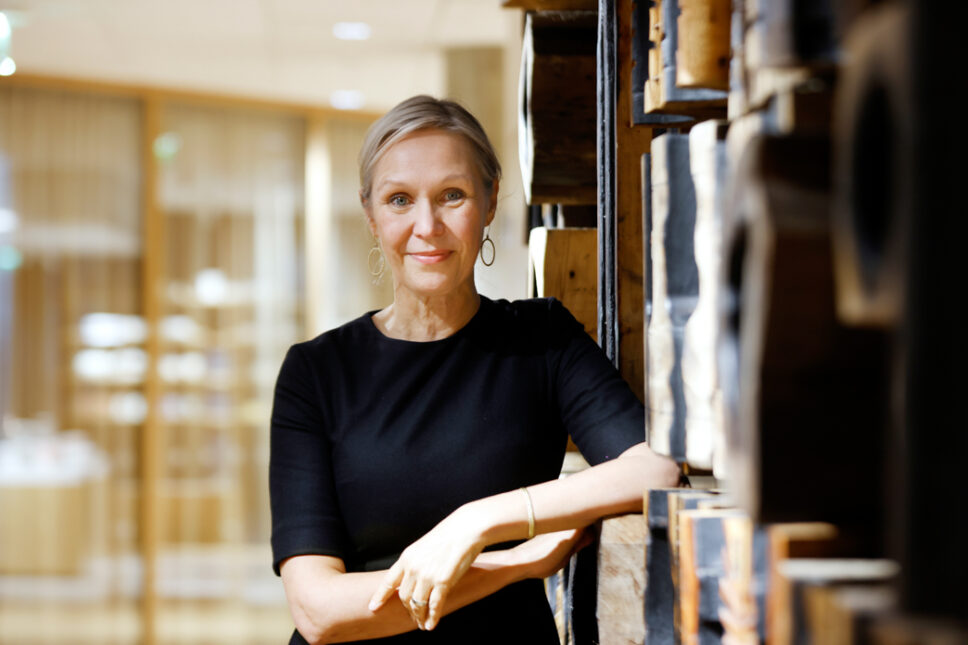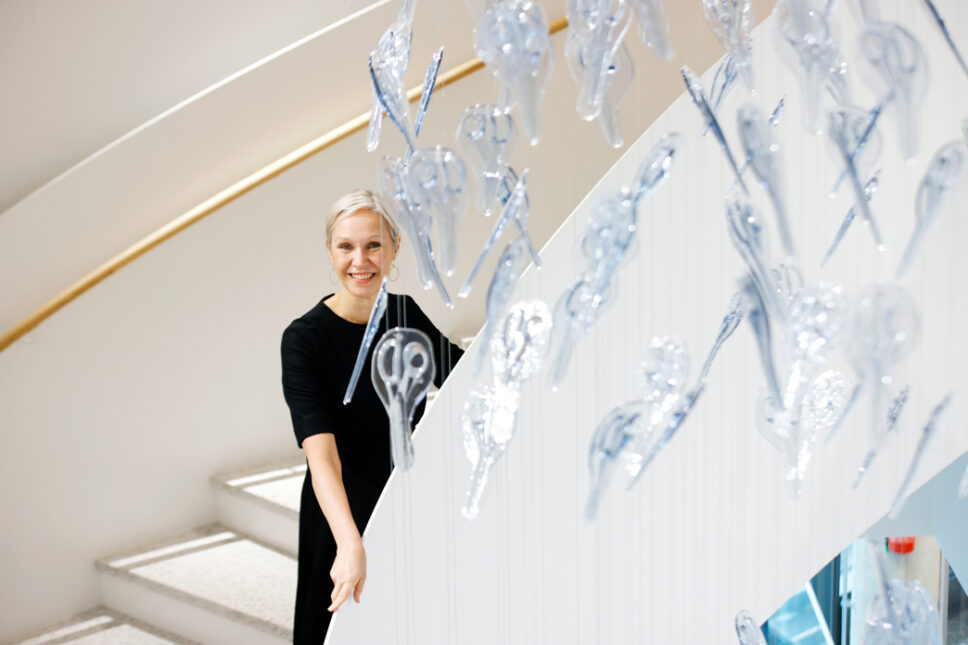Fiskars is investing and aims to reduce its emissions by 60 per cent: “Sustainability does not hinder successful business.”

Fiskars Group aims to cut its greenhouse gas emissions by 60 per cent by 2030. Sustainability is a business enabler for Fiskars, and VP Kati Ihamäki encourages companies to look at sustainable investments over the long term. “Sustainability investments pay for themselves.”
In the future, the Iittala glass factory will make Oiva Toikka’s Birds and the Aalto range of vases in melting furnaces powered by renewable electricity and cutting-edge technology. This is made possible by the EUR 10 million of energy investments made by Fiskars Group with EU support.
The energy investments will reduce the carbon dioxide emissions of the Iittala glass factory in Hämeenlinna by 74 per cent by the end of 2026. The energy investments will be spread from 2022 to 2026, as it is not possible to convert the factory’s entire production to electricity overnight. The transition is happening in a controlled manner and gradually to ensure that production keeps going.
At the moment, the furnaces burn natural gas. When the transition is complete, the glass-melting furnaces will consume 67 per cent less energy. Up to now, they have been the biggest energy consumers.
“The investment will also affect the local air quality. The factory’s emissions of nitrogen oxide and fine particulate matter will decrease significantly,” says Kati Ihamäki, Vice President of Sustainability and Public Affairs at Fiskars Group.
- Fiskars Group was established as an ironworks in 1649. It is the oldest Finnish company still in business.
- A metal, glass and ceramics group that operates globally.
- The group expanded through several acquisitions in the 2000s, including the acquisition of Iittala Group in 2007.
- Headquarters in Keilaniemi, Espoo.
- Turnover was EUR 1.2 billion in 2022.
- Nearly 7,000 employees in 29 countries.
- In 2022, EcoVadis awarded Fiskars Group the platinum medal for sustainability. EcoVadis assesses corporate responsibility globally by classifying companies based on their environmental performance, employees’ rights and human rights, ethics and sustainable procurement.
- In 2017, Fiskars Group donated a 40-hectare park in Källviken, Tammisaari, to Metsähallitus, the Finnish forestry agency, for a hundred years at an annual lease of EUR 1. At Fiskars’ initiative, the area became an official nature reserve.
In October 2022, the EU awarded funding to cover about one-third of the investment at the Iittala glass factory, totalling nearly EUR 2.9 million.
“The NextGenerationEU funding granted to us by the Ministry of Economic Affairs and Employment enabled this energy investment. The investment is also a major one for Fiskars Group as a whole. It will reduce the group’s emissions by 26 per cent,” Ihamäki says.
Emission and energy reductions – a good business driver
Sustainability is a business enabler for Fiskars.
“It is a business driver for the company, the environment and the people. The Iittala glass factory is a good example of substantial action in terms of financial and emission targets,” Ihamäki says.
“Environmentally sound business is premised on saving materials, electricity and water and producing as efficiently as possible. No waste or mess.”
New technology is constantly entering the market, and Fiskars Group’s personnel are developing operations and creating new product innovations.

Ihamäki says that companies tend to look at investments over time horizons that are too short. Consequently, they shy away from expensive investments that could benefit the environment.
“Sustainability does not hinder successful business. Getting things right the first time may cost a little more in the early phases. But the investment pays for itself. That is how businesses should be managed in any case: with a long-term perspective.”
Ihamäki points out that investment measures lead to changes in occasional bursts rather than a constant stream. However, clear plans are essential. She says that companies should say more about the journeys they have not yet finished and what their goals are based on. It is also good to talk about milestones.
“Finnish people could learn from Swedes.”
“We Finns are a shy bunch. We want to finesse our service or finish our product before we say anything about it. Swedish people are happy to talk about their work before it is finished or even before it starts. Then, consumers can easily get the impression that these things have already been done. They begin wondering why we are late to the party. And yet we might actually be closer to the finish line.”
Making subcontracting chains more sustainable
Fiskars Group aims to reduce the greenhouse gas emissions from its own operations by 60 per cent compared to the 2017 level. The deadline for this reduction is 2030.
“This is a really ambitious target that will require a lot of work.”
The group has production facilities around the world. Ihamäki is excited about the company’s subcontractor activation project, which should be completed in 2024.
“We are making our subcontracting chain more sustainable: helping and training companies to set emission reduction targets based on science. This, in turn, will help us reach our objectives.”
For example, Fiskars Group supports its subcontractors in using and transitioning to renewable forms of energy. If they are not available, subcontractors receive help in considering alternatives.
Alongside Iittala, the group’s brand and product portfolio includes luxury brands such as Royal Copenhagen, a Danish manufacturer of porcelain tableware, Wedgwood, which is based in the UK, and Gerber, the world’s leading producer of specialist knives. The group operates in 29 countries in Europe, Asia, Australia and North America.
Although the brands have different consumer profiles, they share an appreciation of craftsmanship, high-quality production, and long-lasting products that are durable and timeless in design.
The cultural nuances should be apparent.
“We need to understand diversity differently than before. It is an incredible source of innovation. Our employees are not all cut from the same cloth.”
Main target: the circular economy
The group’s main target is that by 2030, the majority of net sales will come from services and products that comply with the circular economy.
“We are now at 8 per cent, so there is still some way to go,” Ihamäki says.
The circular economy target poses challenges to production in some places.
“When we use recycled materials, we need to ensure that the products we make from them are just as durable and high in quality as the originals.”
For example, recycled steel and plastic can be used to make Fiskars’ gardening products, while only a certain amount of recycled material can be used in ceramics for durability reasons.

The company has also developed services that support responsible consumption. For example, some of Fiskars’ pans can be resurfaced. Since 2019, Iittala shops have had a vintage department where customers can bring Iittala, Arabia and Rörstrand products that they no longer use.
“These do not yet constitute a large part of our turnover, but I believe these activities contribute to a mindset of sustainable development. One important duty for us as a consumer brand is to help customers make environmentally sustainable choices and make their everyday lives easier.”
Sights set on global contractual practices
Fiskars Group has studied how sustainability requirements differ between countries and customer groups.
“Climate change has reared its head everywhere. In America, the emphasis is on equality and non-discrimination. Social issues are high on the agenda over there, and brands and companies are expected to take a stand on them. In Asia, the priorities are quality, sustainability and aesthetics,” Ihamäki says.
“Climate change has reared its head everywhere. In America, the emphasis is on equality and non-discrimination.”
She says regional sustainability requirements can sometimes be problematic when operating in international markets.
“I would like the sustainability requirements to be more predictable and consistent. In the EU, regulation is being introduced at such a brisk pace that it is hard to keep up.”
Although the EU is progressive in many areas, Ihamäki says that EU countries should not be lulled into believing that we have the fastest or best solutions to everything.
“The USA has successfully used the carrot approach to advance some issues – such as the use of biofuels – while here we have resorted to the stick. America is also making great strides in website accessibility and equality of services for all groups of people.”
Ihamäki thinks that global contractual practices would be the best option for global businesses. It would make operations more coherent. She also thinks that corporate responsibility in the domain of human rights must also be resolved quickly. There are many differences between countries.
“I would like the EU to at least issue a pan-European recommendation.”
The stick – and hopefully also the carrot
Ihamäki thinks it would be good if the Finnish state could define a minimum requirement in regulation to guide companies in the right direction “with the stick and hopefully also the carrot”.
In her view, setting emission targets is already a normal part of everyday business for larger operators in Finland. However, smaller operators may be less familiar with it. She praises Technology Industries of Finland’s guidance.
“It is great that they look after everyone and take smaller companies into account. They are not just counting on big companies making major investments and taking big steps. If large companies are to stick to their targets, small and medium-sized enterprises must be involved. For many companies, the subcontracting network or the use of products accounts for a large share of their emissions.”

Ihamäki would like companies to work together more and learn from each other in the area of corporate responsibility.
“We companies nudge each other forward somewhat in the sustainability debate. Of course, we are competitors but, above all, we can urge each other onwards.”
She says that people should not engage in finger-pointing.
“If someone has tried their best in good faith and it has not gone exactly as planned, we should encourage them and praise them for trying. Point them in the right direction.”
Much to learn about biodiversity
Ihamäki thinks that companies are already fairly knowledgeable in climate matters, but she is concerned about a lack of biodiversity expertise.
“We all have a lot to learn about that. It is an area where action should be taken straight away. We should be talking about the materials companies use and, more generally, how nature is used in production. People should learn to zoom out to the big picture, so climate action does not impair biodiversity.”
“We should be talking about the materials companies use and, more generally, how nature is used in production.”
Ihamäki says it is not enough for companies, states, citizens and consumers to do things on their own.
“This must be a joint effort for all.”
Regulators must also listen to the concerns of businesses.
“It is such a shame lobbying has a negative reputation in Finland. It is important to maintain a dialogue about the possibilities, difficulties and ways of addressing things.”
For example, she says that NGOs are good at sparring.
“Sometimes they nag, but they put the issues in the limelight. They have sustainable development experts among their number. The media should also raise issues and encourage companies even more.”
However, she says cooperation between NGOs and companies must be two-way.
“Then we can learn from each other. We can also say that we would like to do certain things, but not everything is possible yet.”
Teksti: Marjo Vuorinen
Kuvat: Liisa Takala
